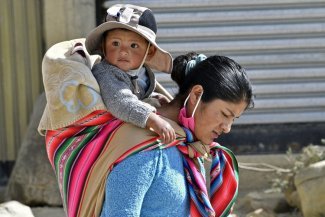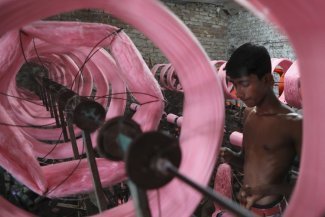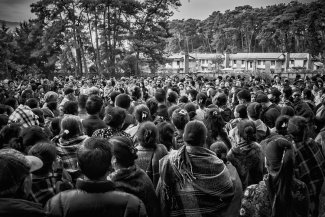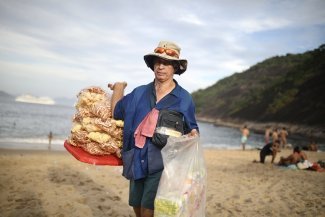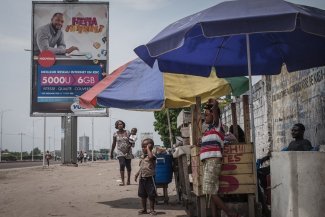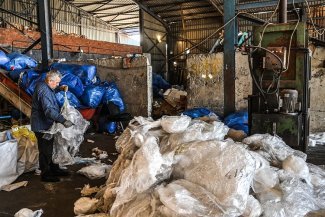Bolivia’s urban contraband markets are a reflection of the country’s economic, social and historical reality. Operating on the margins of legality, they provide a vital lifeline for many families and reveal a complex relationship between necessity, informality and economic adaptability. La Paz (Bolivia), 2024.
It’s 5pm on a lively Saturday afternoon in the city of Cochabamba, Bolivia. A central avenue has become the epicentre of what is now popularly known as the feria del contrabando, or contraband market. As the sun sets, vendors rush to set up their stalls amid a hectic atmosphere. A wide variety of products acquired through irregular channels are on sale here for attractive prices.
The illicit trade of goods on which no taxes are paid has been a persistent problem in Bolivia as well as throughout Latin America. According to the World Customs Organization, the region accounts for 80 per cent of global smuggling. Due to its geographical position and its lax controls on irregular trade, Bolivia has proven to be particularly fertile ground for such activities.
According to a study on smuggling in Bolivia presented by the country’s National Chamber of Industries (CNI), the value of smuggled goods over the last decade amounted to US$26 billion and increased by 44 per cent between 2013 and 2022. In 2022, the total value of smuggled goods exceeded US$3.3 billion, or about 8 per cent of the country’s Gross Domestic Product (GDP).
As Beatriz Muriel, executive director of the Institute for Advanced Development Studies (INESAD), tells Equal Times, trade in smuggled goods has become an important source of income, attracting a significant number of workers from other areas at a time when costs are high. Meanwhile, the state has difficulty policing such activities due to the large number of people working informally: according to the International Labour Organization (ILO), more than 80 per cent of Bolivia’s population works in the informal economy, one of the highest rates in the region. This dynamic affects women in particular, who make up 87 per cent of those working informally in Bolivia.
“It’s a population looking for work and trade is an easy entry point. In addition, the Aymara and Quechua populations have a very long tradition of trade dating back to colonial times. This knowledge is passed down from generation to generation. So they know how to be traders,” says Fernanda Wanderley, director and senior researcher at the Instituto de Investigaciones Socio-Económicas (IISEC) at the Bolivian Catholic University.
Smuggling thrives on the informal economy, limited opportunities and disillusionment with formal employment that never materialises. An estimated two million people (out of a population of around 12 million) are employed in the trade of smuggled goods. None of them receive social security, retirement or other benefits associated with formal employment.
However, the families involved in these activities range from “subsistence to high income, depending on the smuggled goods they sell. The items for sale at contraband markets range from notebooks to cars,” Muriel says.
As smuggling in the Andean country has increased, informal markets have expanded into its largest urban centres. The presence of families at these markets also attests to the reality that vendors face: despite occupying the last link in the smuggling chain, they are criminalised, even as the larger public openly consumes contraband products at these markets.
Contraband and the informal economy: a persistent structural phenomenon
“In many Latin American countries, informality grew in the 1980s and 1990s, when neoliberal policies began. In the case of Bolivia, informality predates this period and only increased during it. In other words, at no point in Bolivia’s contemporary history have a majority of its workers been formal,” says Wanderley, describing the structural and historical nature of economic informality in Bolivia. And trade, she notes, has always been part of the informal economy.
Moving through the hustle and bustle of city markets, one often hears vendors using the term case, a local expression of respect, to address their customers. The mostly female vendors, who offer a variety of food, cleaning and cosmetic products for sale, are skilled at persuasion. One buyer among the crowd says that she mainly visits these markets for the “more affordable prices” compared to the formal market. Many Bolivians share this economic reality.
"In a population where wages are low, smuggling controls inflation and opens up the possibility of greater consumption. Used clothing or household appliances, for example, are cheaper to purchase. Toys are cheaper than in any formal shop, which pays all the taxes and is taxed for its workers. None of the workers at the markets are paid formally. Everything is informal, so the prices are cheaper,” Wanderley explains. Consumers who buy irregular merchandise from these vendors understand that they are participating in a dynamic of mutual benefit.
The transactions that occur at these busy markets are thus much more than simple commercial exchange: they are a reflection of people’s life stories, an expression of both their needs and their resilience.
“In the beginning, vendors sold exclusively out of their cars, mainly vans. Sales were made by opening and closing the car doors. Over time, they have moved onto the pavements and streets,” says Virginia Flores, an independent analyst.
According to Flores, many families living in cities resorted to smuggling to cope with the crisis brought on by the pandemic. Once confined to border areas, trade in contraband has moved into the country’s largest cities. As Flores explains, various dynamics and consumption patterns provide valuable information on the different actors involved in smuggling and the complexity of the phenomenon.
“It’s important to understand that the group of people [within the smuggling chain] is not a homogenous mass. There is social stratification amongst them. While most are family groups, they can be upper, middle or lower class…[.] Then, there are those who earn a lot of money, who you could say become rich. Then, there are the middlemen. Finally, there are the small vendors [at the markets], who are in the most precarious position,” Wanderley adds.
A personal story behind every sale
In Bolivia’s economic landscape, “behind the big business groups, such as the oil industry, there are the big importing companies, which tend to be middle or upper class. These include everything from people of Aymara and Quechua descent, including those who built the cholets [a unique architectural style of building in the department of La Paz] in El Alto, to people [of Spanish descent] who are in a well-to-do position and who earn a lot more money, who get rich at the markets. When you go to the markets you only see the vendors, you don’t see the whole chain behind them,” says Wanderley.
A tour of the urban contraband markets, which operate without restrictions even during the day, is a narrative journey through the experiences of the families who form part of the last link in the smuggling chain. The people who sell the goods have the hardest job and are in a position of extreme vulnerability
The case of Juana (not her real name), a 38-year-old mother of five, is representative of the situation that many vendor families face. “Necessity forces you to be resilient,” says Juana, who, with joy and charisma, personifies the dignity and renowned resilience of Bolivian women.
Juana’s story is also typical of the women who in many ways are the face of informal trade in the Andean country. In addition to the risks that come with selling in the city at night, they carry heavy boxes and face inclement weather. But they also have to play the dual role of mother and head of household, balancing childcare with the demands of working on the street.
“I do everything by myself. During the day I get everything organised, I get up, I take care of my children. At noon I make sure they get a good meal, I finish what I have to do at home and at 4pm I head to the market to sell until 10 or 11pm at night. I get home around midnight and the next day I do it all over again. It’s exhausting,” says Juana. Despite her training as a prosthetist, the difficulty she encountered in finding formal employment led her to find work selling contraband products for someone else.
According to Wanderley, the contraband markets constitute a clear case of exploitation, characterised by the prevalence of informal, unstable and unregulated employment. The mostly female environment ends up drawing many family members (in some cases newly arrived from rural areas).
Lucía (not her real name), 20, who came from the countryside to the city to help her aunt sell at the markets, recounts the complexities of her experience, which sometimes includes harassment. “It’s complicated because, in addition to the hassle of selling, as a young woman you can’t even sell in peace. There is always someone trying to bother you while you work,” she says.
Lucía, who also looks after her two younger sisters, longs to migrate abroad in search of better opportunities. Driven by the perception of low wages in Bolivia’s formal sector, she doesn’t see the sale of smuggled goods as a sustainable solution to improve her family’s situation either.
“The prices [given to us by middlemen] are higher now. That’s what has made made things more complicated. You used to be able to sell a lot but now you sell very little,” explains Lucía.
Juana also points to the criminalisation that vendors face. “How many professionals are now working as taxi drivers or chauffeurs? I mean, they aren’t working in their profession. It’s a very sad reality,” she says.
According to the INESAD report El desafío de contar con trabajos dignos para todos (The Challenge of Supplying Decent Jobs for All), despite having labour rights set out in the Bolivian constitution, the majority of the South American country’s citizens are still trapped in precarious jobs.
The report highlights informality and smuggling as key factors contributing to this situation and negatively impacting the formal sector, and stresses the need to improve conditions. However, tackling informality in Bolivia is hampered by deep-rooted structural and historical problems which prevent new alternatives from arising.
“When 70 per cent of the population doesn’t contribute to the AFPs [pension funds], that’s a very serious situation. It means that people can’t stop working and generating income. Elderly people are finding themselves in an increasingly difficult position: they simply can’t afford to grow old,” says Wanderley.




